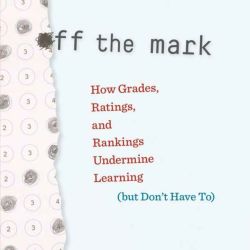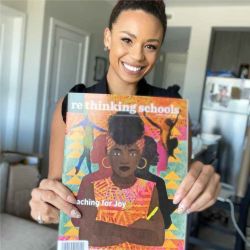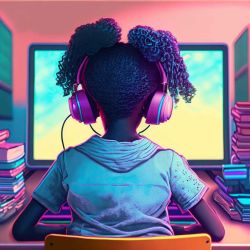Share

Human Restoration Project
65: Virtual Learning and COVID-19 w/ Jesse Stommel PhD
Today we're covering COVID-19 and how it impacts the education system. Depending on when you're listening to this podcast, you're likely facing your school's physical environment shut down, or soon to be doing so. In Ohio, all schools are now expected to have at least three weeks out starting on Tuesday - and schools are frantically trying to prepare how they'll tackle this shift.
Most districts across the United States are continuing the expectation of academic coursework across this disruption - and we have no idea how long it will last. Most teachers do not have formal training in adapting their class to a virtual environment, nor does everyone have even close to a 1:1 environment. This episode will assume that educators are dealing with a virtual shift, and looking for a place to start, further resources will be posted in the show notes concerning paper-based methods.
Jesse Stommel, a leading expert on digital critical pedagogy, hybrid pedagogy, and assessment. He is the Digital Learning Fellow and Senior Lecturer of Digital Studies at University of Mary Washington. Further, Jesse is the co-author of An Urgency of Teachers: the Work of Critical Digital Pedagogy, and a documentary filmmaker.
- Jesse Stommel’s Website
- Kajeet - an affordable hotspot that uses mobile data (for students lacking access
- “Friggin’ Packets” Blog and Podcast from Cult of Pedagogy - for ideas on alternatives to masses of papers
- UNICEF - Learning Through Play - for ways to introduce play-based learning to the home, primarily aimed at younger students
More episodes
View all episodes

148. How do Americans really feel about controversial topics in school? w/ Anna Saavedra and Morgan Polikoff
36:57In this episode, Anna Saavedra and Morgan Polikoff explore the polarizing landscape of modern education found in their February 2024 report, "Searching for Common Ground.” The report reveals widespread support for public schools alongside significant partisan divides, particularly on topics like LGBTQ identities and racial inequality. From bipartisan consensus on some issues to stark disparities on others, this discussion highlights the complexities of education policymaking and the need for informed dialogue to navigate contentious topics and shape a more equitable future for education.Links:How Americans really feel about the teaching of controversial topics in schools @ USC TodayRead the full report online.
147. Americanization or Autonomy: The Dilemma of Puerto Rico's Educational Agenda w/ Prof. Jenaro Abraham
42:20Join us as we delve into the historical and current relationship between the United States and Puerto Rico, focusing on the island's education system and its role in shaping Puerto Rico's future. Professor Jenaro Abraham shares his expertise on social movements, politics, and education in the Caribbean, offering key insights into Puerto Rico's quest for self-determination. From the legacy of colonialism to the prospects of statehood versus independence, this conversation explores the complexities of Puerto Rico's identity and its educational landscape. Additional Resources: Jenaro Abraham @ GonazagaPuerto Rico in the American Century, By César J. Ayala, Rafael BernabeCentroPRPedagogy of the Hawaiian Islands podcast series
146. Off The Mark: How Grades, Ratings, & Rankings Undermine Learning (But Don't Have To) w/ Jack Schneider & Ethan Hutt
47:04“Let's start with the bad news.” is how the conclusion to my guests’ book about changing grading practice begins. “No one is coming to save us. No consultant is going to sweep through and fix things for a fee. No new technology, digital, online, or otherwise, is going to change the game.” The game, of course, is school, and the currency of that game is grades.Jack Schneider is Dwight W. Allen Distinguished Professor in the College of Education at the UMass - Amherst. He is the Executive Director of the Beyond Test Scores Project. Director of the Center for Education Policy. Co-Editor of the History of Education Quarterly, and Co-Host of the Have You Heard Podcast.Ethan Hutt is the Gary Stuck Faculty Scholar in Education and associate professor at the UNC Chapel Hill School of Education.Their 2023 book, Off the Mark: How Grades, Ratings, and Rankings Undermine Learning (but Don’t Have To), is a thorough, and at times frustratingly pragmatic, exploration of flawed necessity of the load bearing pillars of “real school” – grades, transcripts, and standardized tests – their origins in our nation’s history, the distorting effects they tend to have on the outcomes and goals of education, why nothing has arisen so far to replace them at scale, and why there are no magic potions: “No one is going to wake up one morning and realize that the answer was staring us in the face all along,” they remind us.Balancing the real with the ideal, they also chart a path toward the possibility for something different, and like the grand experiment of public schooling itself, it’s something we’ll have to figure out and build together.Off The MarkJack SchneiderEthan Hutt
145. Rethinking Schools w/ Cierra Kaler-Jones
28:30In this episode, we talk with Rethinking Schools first-ever Executive Director, Cierra Kaler-Jones, about the past, present, and future of Rethinking Schools, especially as we enter another potentially contentious year of educational culture wars for 2024, and her vision for how educators can demand power for those who need it the most within our school system. Links:Rethinking Schools
144. Systemic Social and Emotional Learning (SEL) w/ Dr. Emma McMain
46:18Today we are joined by Dr. Emma McMain. Emma works in the College of Education at Washington State University as a postdoctoral teacher and researcher, focusing on assessment for pre-service elementary teachers, cultural considerations in education, and social and emotional learning (SEL). Her work aims to promote social and ecological justice, seeing education as an important site of social transformation. Dr McMain's recent works include: Drawing the line: Teachers affectively and discursively question what counts as “appropriate behavior” in schools — which dissects the power dynamics of classrooms in determining what is “appropriate” behavior; and The “Problem Tree” of SEL: A Sociopolitical Literature Review — which contextualizes what social-emotional learning actually means in a classroom setting from a variety of perspectives and in history. Particularly, we wanted to reach out and talk more about the idea of SEL as systemic change versus SEL as an add-on, and why this matters as we think about racism, sexism, neoliberalism, and more, especially in the context of SEL in the ongoing culture war and attacks on schools.More about Dr Emma McMainDrawing the line: Teachers affectively and discursively question what counts as “appropriate behavior” in schools
143. MINDFOOD V: Top 3 (Non-Ed) Spaces to Learn About Education
41:41Reimagining education is no small feat, but there is hope on the horizon. MINDFOOD, easily digestible content for education. In this series, we'll do the random fun stuff: top 10 lists, current events, things we're thinking about. This is a casual format with limited editing and not as many intense conversations that occur in our mainline HRP interviews. Let us know what you think.Learn more about our free resources, podcast, writings, and more at https://www.humanrestorationproject.org/Human Restoration Project is a 501(c)3 nonprofit centered on enabling human-centered schools through progressive pedagogy.
142. Part 3 of 3: Pedagogy in the Hawai'ian Islands feat. Hanahau‘oli School
01:17:41In this incredible final installment of his exploration of the pedagogy of the Hawaiian Islands, Noah Ranz-Lind talks to educators and students at Hanahau‘oli School, a progressive K-6 school in Honolulu. Hanahau‘oli School promises its students an "intimate and nurturing learning community supports connections between home and school and the world, respecting and celebrating the uniqueness of the Hanahau‘oli child while appreciating the interconnectedness that defines our learning ‘ohana. Grounded in tradition yet embracing of innovation, we perpetuate joyous work, committed to being a resource and symbol of learning’s potential." And you will hear ample evidence of the joyous work at hand in this episode! Links:Hanahau‘oli School
141. More Teaching, Less Testing Act w/ Congressman Jamaal Bowman
31:27Chris sits down with Congressman Jamaal Bowman! serving New York's 16th district since 2021. Bowman was a crisis management teacher in an elementary school in the Bronx, who eventually founded his own public school, the Cornerstone Academy for Social Action, a middle school in Eastchester. For years he maintained a blog on changing school policy and standardized testing, with a focus on being deeply involved in the opt-out movement to encourage families to not take the tests, as well as centering pedagogy on social emotional health and restorative justice.Congressman Bowman’s team reached out to Human Restoration Project to talk about the More Teaching, Less Testing Act (linked below). The policy lessens the number of tests given each year in schools, limiting the number of tests all students take and finding other ways to gather data, such as through a smaller but representative sample size. Please note that Human Restoration Project is a 501(c)3 nonprofit organization and that this interview is not an endorsement of Bowman or his electoral campaign.More Teaching, Less Testing Act: https://bowman.house.gov/_cache/files/8/9/89180377-ee4a-4906-b170-f4ee28d3602e/0D579FD78ABAA89748EA157D3F31CAB1.more-teaching-less-testing-act-bill-summary.pdfA video of this conversation in available on our YouTube channel: https://youtu.be/y9Aw4EsH_yc
140. Gamification vs. Game-Based Learning: What's up? w/ Dr. James York & Dr. Jonathan deHaan (Ludic Language Pedagogy)
01:09:17On today’s podcast we’re joined by two founders of Ludic Language Pedagogy or LLP. LLP is an open access academic journal and community focused on publishing actionable ideas on “ludic”, or playful, ideas, and language learning, such as through tabletop RPGs, live action role playing, card games, and video games. For example, recently published papers include “Teaching Spanish with The Legend of Zelda: Ocarina of Time” and “Places, people, practices, and play: Animal Crossing New Horizons here and there.”James and Jonathan are currently writing a book on ludic pedagogy, and they led a session at our recent Conference to Restore Humanity! on ludic teaching that is definitely worth checking out. This conversation centers the distinction of gamification from game-based learning: what's the difference? Why does it matter? How does it apply to teaching and learning?GuestsDr. James York is the editor in chief of LLP and a senior assistant professor at Meiji University, where he teaches and conducts research on the application of games, play and literacy. Dr. Jonathan deHaan is an associate editor and associate professor in the Faculty of International Relations at the University of Shizuoka, who focuses on teaching literacy with games.ResourcesLudic Language PedagogyLLP @ Conference to Restore HumanityPac Manhattan